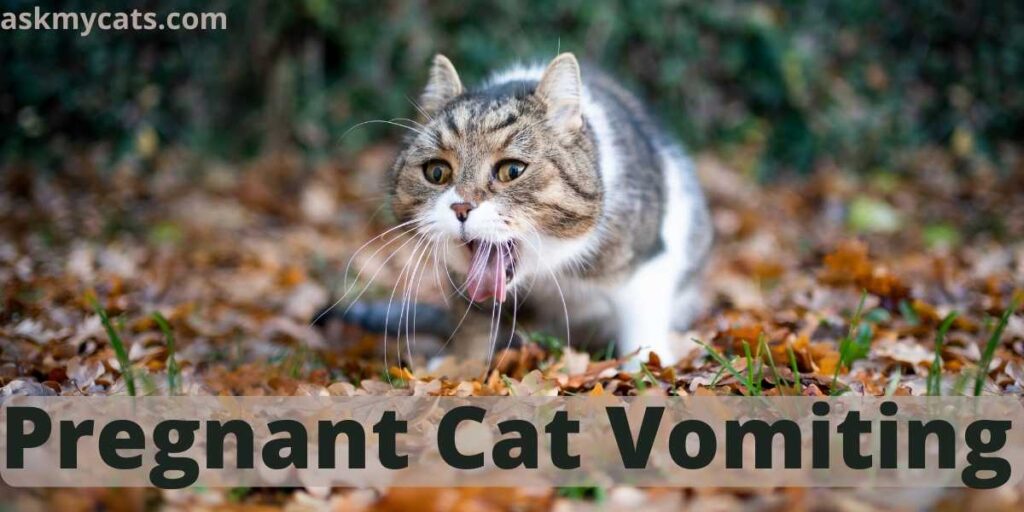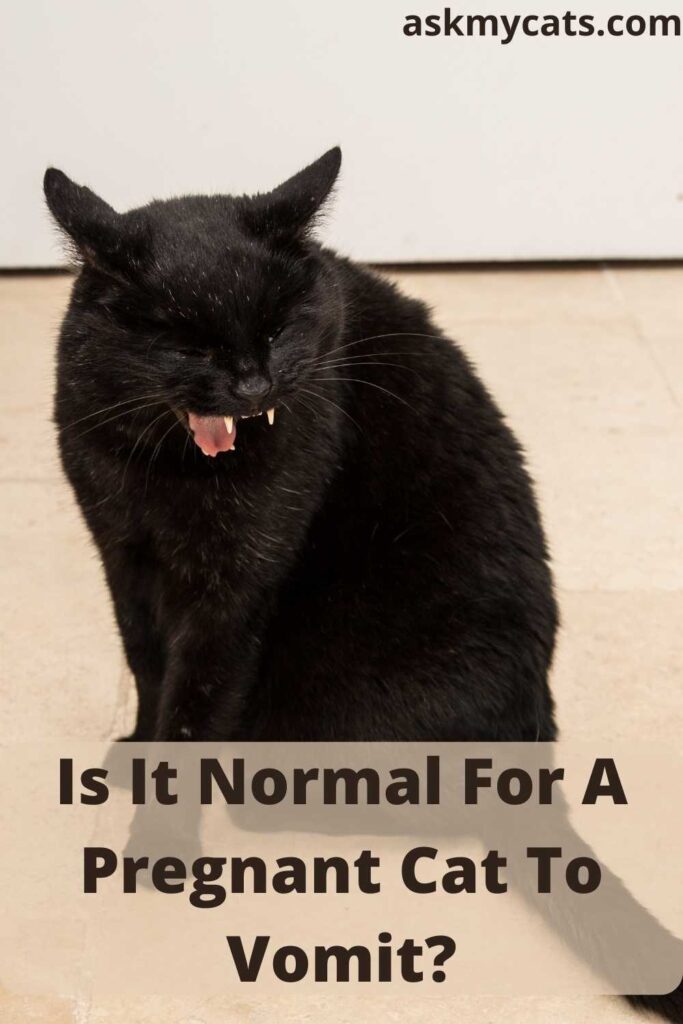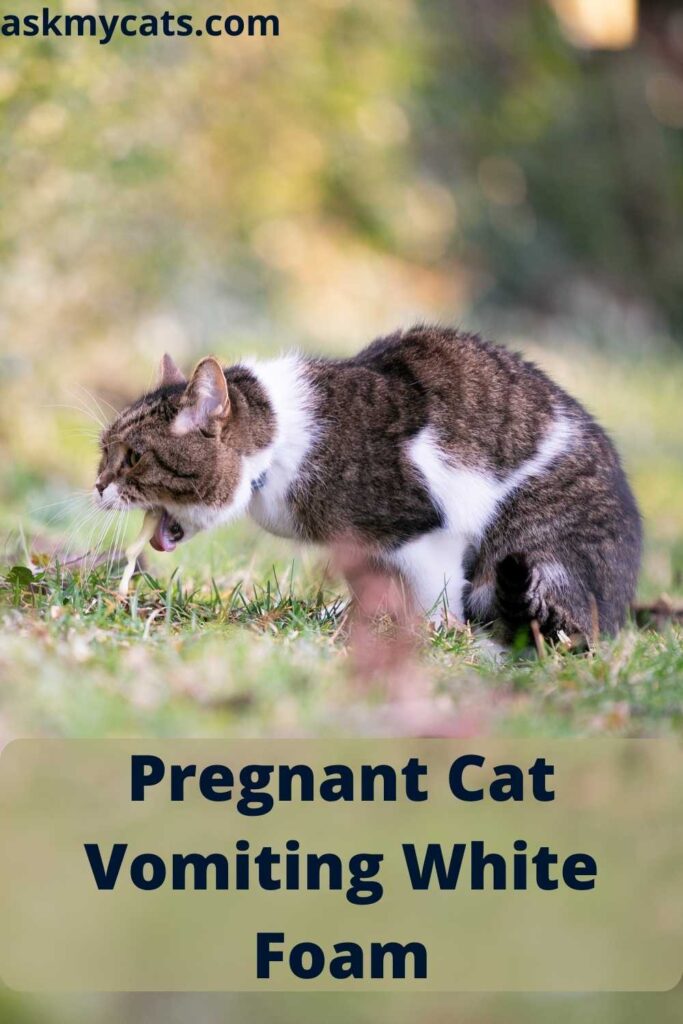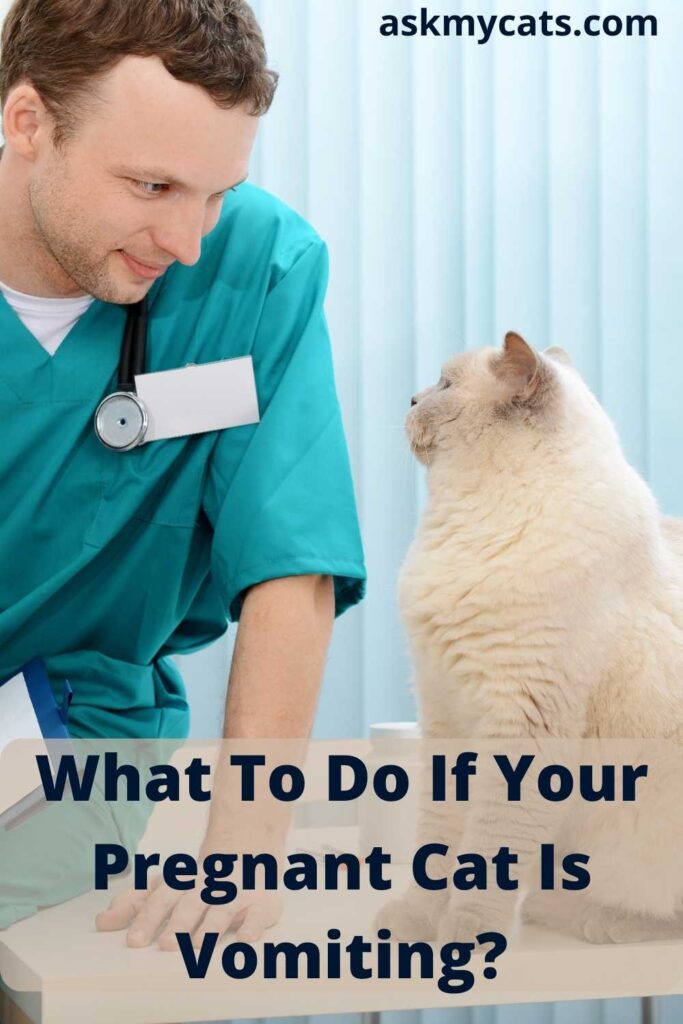The unmistakable hacking sound of cat vomiting is all too known to most cat owners. But just because we’ve all heard it doesn’t mean it should be the norm.
Vomiting in pregnant cats is frequently just morning sickness or an early indicator of the disease, so don’t dismiss this significant shift in your cat’s health.
So, why is my pregnant cat vomiting?
Your pregnant cat could be vomiting for a variety of reasons, from morning sickness to health issues, that is why you must consult a vet as soon as you notice your pregnant cat vomiting.
Keep reading this article, to know more about the reasons why your cat is vomiting and how can you help her.


Give Your Cat the Perfect Day
Get the Free Ebook!
Is It Normal For A Pregnant Cat To Vomit?
Yes, it is normal for a pregnant cat to vomit at the early stage of pregnancy because of morning sickness.

Cats are unable to communicate, thus they cannot express their morning sickness or bloating.
Unfortunately, that leaves you completely in the dark regarding whether or not your queen cat is carrying a litter.
Unexpectedly, female cats can experience morning sickness occasionally, just like their human counterparts.
A cat may experience painful morning sickness around the end of the first month of her pregnancy.
Vomiting is the name of the game and lots of it. Hormone fluctuations and uterine stretching both frequently cause nausea and vomiting.
This throwing up frequently occurs along with your cat’s complete loss of appetite.
Don’t be surprised if she simply walks away from her meal bowl as if it were the most disgusting thing ever. The morning sickness phase often only lasts a couple of days.
Don’t assume anything if your female cat is throwing up and you’re not sure if she’s pregnant or not.
For a variety of causes, including frequently abrupt and fast dietary changes and eating too quickly, our fluffy friends vomit.
Along with other medical conditions including hairballs, diarrhea, and heartworm illness, vomiting can also be a sign of other health issues.
When you’re not sure what’s wrong with your child, time is of importance. Take her right away to the vet to be examined.
Cats who experience frequent vomiting or morning sickness frequently struggle with eating issues.
However, pregnant cats need to eat healthily, consistently, and appropriately just like any other kitties, so if you find that your queen hasn’t touched her food in more than 48 hours, call a vet right once.
It is your responsibility to keep an eye on your cat’s health and safety when she is nursing kittens.
Pregnant Cat Vomiting White Foam
The reason why your pregnant cat may be vomiting white foam could be indigestion, hairballs, gastritis, or irritable bowel syndrome.

There could be a number of underlying causes, including indigestion, hairballs, gastritis, irritable bowel syndrome, and more if your pregnant cat is vomiting white foam.
Your veterinarian can assist you in determining the cause of your pregnant cat’s illness and how to make your pet feel better.
1. Indigestion
Similar to humans, cats also create hydrochloric acid and other gastric secretions in their stomachs to help in food digestion.
The accumulation of juice and acid, though, might irritate the stomach and cause your pregnant cat to vomit if they skip a meal or aren’t fed on time.
In addition to white foam, cats with indigestion may also vomit yellow foam.
If you and your veterinarian believe that your pregnant cat’s vomiting is caused by indigestion, your veterinarian may advise providing short, frequent meals at the same time each day to prevent any accumulation of stomach acid.
2. Hairballs
All cats lick themselves to groom themselves, which inevitably results in their eating fur. Fur can occasionally pass through their stools, but it can also accumulate and become difficult to pass.
Your pregnant cat will vomit up the fur when this happens because it needs to go somewhere.
If your pregnant cat is throwing up white foam but has no fur yet, it may be the beginning of a hairball.
There are over-the-counter dietary supplements available in chewable or gel form to prevent hairballs.
Adopting a regular brushing routine will also assist in removing any excess fur that your cat might eat when grooming itself.
3. Gastritis
It’s likely that your cat has irritated their stomach with anything they’ve eaten if they tend to get into things they shouldn’t.
When this occurs, in addition to seeing vomiting blood and/or bile, you might also witness vomiting white foam.
Additionally, your cat can be displaying a decline in appetite, a downcast demeanor, lethargy, or dehydration.
If your pregnant cat is throwing up due to gastritis, your veterinarian will know just what to do.
4. Irritable Bowel Syndrome (IBS)
One of the most typical causes of vomiting in cats is irritable bowel syndrome, often known as inflammatory bowel illness.
IBS-afflicted cats may potentially develop chronic decompensation or diarrhea.
If your veterinarian has a suspicion that your pregnant cat has IBS, they will want to order lab tests to confirm the diagnosis before coming up with a treatment plan to help your pregnant cat feel better.
5. Pancreatitis
Pancreatitis can affect pregnant cats just like it can affect dogs and people. Either acute or chronic disease can exist.
Additionally, it may co-occur with conditions including diabetes, liver illness, or gastrointestinal or liver problems.
Lethargy, loss of appetite, dehydration, weight loss, low body temperature, jaundice, fever, and gastrointestinal pain may also be indicators of pancreatitis in cats.
Your veterinarian will probably start treating your pregnant cat’s pancreatitis with fluid therapy and drugs if that is the cause of the vomiting.
6. Hepatic Insufficiency
Both milder symptoms like vomiting, anorexia, or weight loss in cats as well as more severe ones like jaundice, or yellowing of the skin and sclera, are signs of liver illness (whites of the eyes).
Although liver disease cannot be cured, the symptoms can be controlled. To help your pregnant cat feel better, your veterinarian will develop a treatment plan.
7. Diabetes
Similar to dogs and people, increased thirst and urination, as well as vomiting, weight loss, and dehydration, are the main signs of diabetes in cats.
Make an appointment right once to have your cat examined by your veterinarian if they are increasing unexpectedly, either alone or in conjunction with any of the other symptoms listed.
Your veterinarian may recommend starting insulin therapy or a straightforward diet adjustment, depending on the severity of your cat’s diabetes.
8. Hyperthyroidism
Another extremely typical condition affecting geriatric cats is an overworked thyroid. In addition to vomiting, symptoms may include diarrhea, increased urination, and loud vocalizations.
Weight loss may also occur despite increased eating and drinking.
Your vet will order bloodwork to examine the thyroid hormone levels if your elderly cat exhibits any of these signs.
Your veterinarian will discuss daily medication with you if your cat does truly have hyperthyroidism in order to address the disease’s symptoms.
Interesting Read: Why Is My Pregnant Cat Not Eating?
Pregnant Cat Vomiting Yellow Liquid
The reason why your pregnant cat is vomiting yellow liquid could be that she is vomiting with bile.
A cat’s liver produces bile, a yellow or green liquid that aids in food digestion. Bile vomiting in cats can be a frightening ailment for both the cat and the anxious owner.
Unless you manage to catch your cat in the act of vomiting, vomiting with bile may be particularly challenging for an owner to notice given that animals are likely to clean up after themselves.
It may be challenging to pinpoint the exact duration of the disease as a result.
It’s crucial to be aware of the warning signs and symptoms of bile vomiting in order to know when veterinary help is required.
Bile vomiting can happen at any time, but it usually happens in the morning or early evening when a cat’s stomach is empty.
The following are the primary signs to look out for:
- Long-term occasional vomiting
- Vomiting that occurs with bile which may be yellow or green and/or foamy. There is normally not a large amount of liquid
- Weight Loss
- Disinterest in Food
- Excessive Drooling
There are many different sorts of vomiting, so it’s critical to recognize them in order to determine when a serious condition justifies a visit to your neighborhood vet.
True vomiting: A cat may drool, feel queasy, and vomit. They may also refuse food. Some people may lick their lips and experience temporary depression. Before and during a puke, the abdomen tenses up dramatically. Your cat might vomit and choke.
Interesting Read: Pregnant Cat Drooling: Reasons & Solutions
Regurgitation: Regurgitation is the act of the stomach pushing up partially digested food. A cat is not queasy and there are no belly cramps. One of the many possible causes is eating too soon. Bile must not be observed.
Hairball: Your cat may appear to be vomiting when it regurgitates or expels hairballs from its stomach. Due to the violent coughing, the cat may heave for a few seconds in an effort to dislodge the hairball and may also bring up some stomach fluid or regurgitated food.
The precise reason for bile vomiting is frequently unknown. Your veterinarian should rule out any of a number of conditions that could be the cause of the ailment.
Typical causes could be:
- Intestinal Inflammation
- Irritation of the Stomach Lining (gastritis)
- Pancreatitis
- Cholangiohepatitis
- Improper Diet
- Parasites
- Infection
- An obstruction
- Liver Disease
- Kidney Disease
- Toxin ingestion
- Cancer
Your veterinarian will initially inquire about your cat’s medical history in order to determine the cause of the issue.
It is crucial that you record the frequency, number of occasions, and approximate start date of the vomiting.
If at all possible, you should also take a stool and urine sample, as well as provide your veterinarian with the name of the company and the precise ingredients in any commercial cat food you give them.
Your veterinarian may decide to run a number of diagnostic tests after analyzing your cat’s medical history in order to rule out any significant, life-threatening diseases.
These tests may consist of urinalysis for the assessment of the liver and kidneys, a complete blood profile with analysis of the white blood cell count, and a comprehensive physical examination.
Additionally, your veterinarian might use imaging tests like x-rays or ultrasounds to check the stomach’s contents’ motility and for any potential obstructions.
Also, Read: Pregnant Cat Diarrhea: Reasons & Solutions
What To Do If Your Pregnant Cat Is Vomiting?
If you notice your pregnant cat is vomiting you must take her to the vet as soon as possible so that treatment could get started if there are any medical issues.

Your veterinarian may suggest diagnostic testing to identify the source of the vomiting if your cat needs veterinary care for it.
Potential diagnostic procedures include radiography (X-rays), ultrasonography, urinalysis, electrolytes, thyroid levels, blood chemistry, complete blood counts, and more.
Vomiting has some basic supportive care options, however additional treatment suggestions may be given based on the outcomes of the tests.
Anti-nausea drugs, subcutaneous or intravenous fluids to restore and maintain hydration, and bland food to facilitate digestion are all part of supportive veterinary care for vomiting in cats.
Some cats can be treated as outpatients, which means the vet will do some treatments in the clinic and then send you home with drugs to give to your cat.
Other cats with more severe illnesses may require hospitalization for 24-hour care.
Some cats heal fast, while others take longer. This is usually determined by the underlying reason for the vomiting as well as the cat’s overall health.
When it comes to your unique cat, your veterinarian is the finest source of advice.
Interesting Read: Cat Has Diarrhea After Giving Birth: What Should You Do?
Frequently Asked Questions
Do pregnant cats throw up before labor?
Yes, some cats do throw up before labor. Your cat’s rectal body temperature may drop below 99 degrees Fahrenheit and she may vomit. You might see the abdomen “drop” a few days before labor, and the cat’s nipples might get larger, darker, or pinker.
Can a pregnant cat recover from vomiting yellow liquid?
Stomach problems can take time to heal, and your cat’s entire digestive system may need to be reset and regrow vital balances of beneficial bacteria. In the case of prescription medication, it is critical to finish the entire course in order to thoroughly resolve the condition. Following the specified course of meals and sticking to a steady diet for food-based treatment can help ease symptoms rapidly. If the dietary regimen is changed, the results will be long-lasting. The majority of cats with this illness will respond favorably to ongoing therapy, whether dietary or prescription-based.
What are the behavioral changes in pregnant cats before going into labor?
Your cat may exhibit restless pacing, panting, excessive grooming (particularly in the area of her genitals), and excessive vocalization. She will also discontinue eating.
Final Words
If you notice that your pregnant cat is vomiting for more than 2 days, it is time to get her diagnosed by a vet to get her treated as soon as possible if there is any underlying health condition.
If you have questions, ask us in the comments section.
Must Read: Cat Vomiting After Giving Birth: Is It Normal?
References
- https://www.vet.cornell.edu/departments-centers-and-institutes/cornell-feline-health-center/health-information/feline-health-topics/gastrointestinal-parasites-cats
- https://vetmed.tamu.edu/news/pet-talk/when-to-be-concerned-about-feline-vomiting/
- https://www.va.gov/WHOLEHEALTHLIBRARY/tools/common-complaints-in-pregnancy.asp
